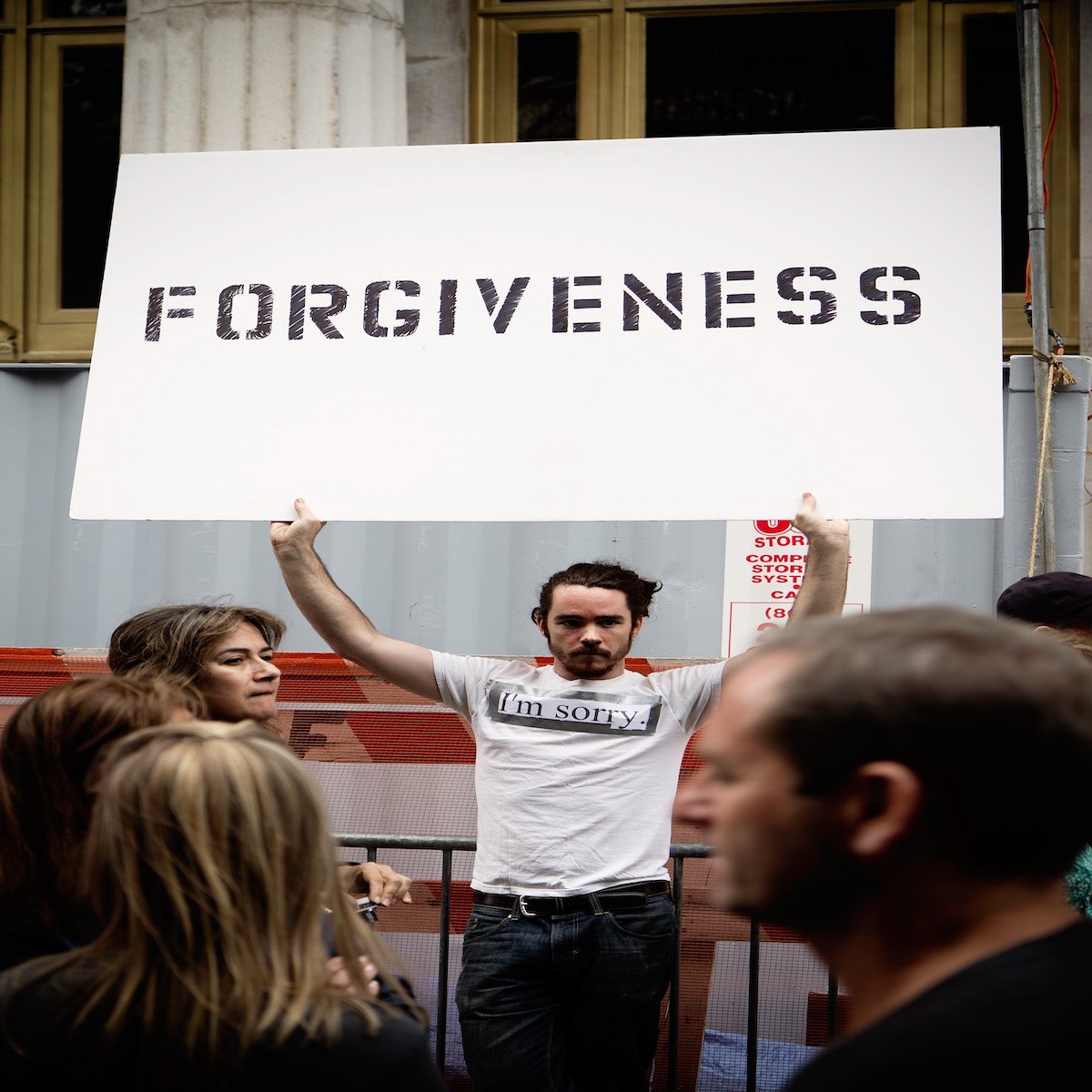Upon his deathbed, it was said that the Spanish patriot Narvaez was asked if he had forgiven all of his enemies. In astonishment, he turned to the priest and replied, “Father, I have no enemies. I shot them all.”
This probably made you smirk. However, you may wish this could be true…or, wait you would never do that (nor would I), right? Our hearts and minds deceive us, especially in relation to forgiveness.
Are you first to ask forgiveness of those you've offended in the world—the first to cast a stone against yourself? How clear and vivid is your assurance and certainty of God's forgiveness and Fatherly Love (1 John 4:20 – read it!)?
In reflecting on Philemon verses 17-25, I want to offer some practical tips about receiving and extending forgiveness and being reconciled one to another.
 Holding people hostage by your unforgiveness is like holding an angry cobra by the tail. That's not gonna turn out well
Holding people hostage by your unforgiveness is like holding an angry cobra by the tail. That's not gonna turn out wellHow can you be a reconciler?
Seven things useful to us in being reconcilers:
#1 - Spend yourself for others
Paul was willing to put his relationship with Philemon on the line. Verse 17 contains the first imperative verb of the chapter—welcome Onesimus. There were special factors complicating this request that made it difficult.
Verse 18 gets specific with the second imperative—charge. Paul says he will pay what Onesimus owes. Paul is doing what he understood Christ did for him. We have all centered our lives around ourselves, what the Bible calls sin.
As a result, we deserve death. Christ took upon Himself the punishment for all who would repent and trust in Him for forgiveness and salvation. God raised Christ from the dead, overpowering death that all who trust in Him might live. Paul calls upon Philemon to forgive Onesimus as Philemon was forgiven by God.
#2 - Paul boldly reminds Philemon of his indebtedness to himself.
Philemon probably came to Christ under Paul’s teaching so he did owe Paul a lot, putting into perspective Onesimus’ debt to Philemon with Philemon’s debt to Paul. (See the parable of the unforgiving servant in Matthew 18.)
We should use our own personal example when working on reconciliation with others. We must call on people to forgive.
You can’t be involved in reconciliation without making some gutsy calls.
#3 - In verse 20, Paul calls on Philemon to forgive because it would benefit Paul.
To “refresh me” is one argument he gives. Paul identifies himself with Onesimus. It would bring Paul joy to see reconciliation between the two.
#4 - Depend on God and express trust in the one you forgive (verse 21).
Be willing to express confidence in a person’s obedience when asking them to forgive.
 Refusing to forgive others shows a lack of belief in the gospel.
Refusing to forgive others shows a lack of belief in the gospel.#5. Help build relationships because relationships become the context of forgiveness.
In Christianity, we become family with people very unlike ourselves. In verse 22, Paul reminds Philemon they will have a continuing relationship and reminds the church of this as well. Family is an important place to learn reconciliation. Reconciliation is the basic part of understanding the Gospel.
#6 - Paul presents himself as an example of forgiveness (verse 23).
We can do the same. Paul brings reminders of reconciliation to Philemon. We want to be the kind of Christians that are examples of forgiveness, not feeding divisions, but bringing peace.
Jesus taught in His sermon on the mount, “blessed are the peacemakers.” Carefully and humbly draw people to your example.
#7 - Remind others of Christ’s grace in their own lives.
Point to Christ. Pray for them.
How can you extend love that forgives?
#1 - Be easy to entreat; allow your affections to be easy to be led (verse 17).
Give the benefit of doubt to those you love and trust. Remember, you are an offender yourself.
#2 - Humble Yourself.
Accept other people’s attempts at reconciliation. Be willing to let others make restitution to you. Remember that someone else made restitution for you. Don’t require it, but be willing to receive it.
Have you ever been forgiven anything?
If we have been forgiven by God, we should are compelled to forgive others. We are called to humble, accepting, loving forgiveness. This will be completed when Christ returns!
#3 - Consider the wider implications of your call to forgiveness – the way forgiveness in one case will relieve pressures in other relationships.
Bless all those affected by your forgiveness.
#4 - Maintain close relationships (verse 22).
Paul is working toward a close relationship with not just Philemon but others in the church. Cultivate close relationships with other Christians.
#5 - Remember the Gospel; it obliges us to forgive and provides us opportunities to show how God has dealt with us in grace.
In Matthew 18:21-22 Peter asks the Lord, “How often will my brother sin against me, and I forgive him? As many as seven times?” Jesus replies, “I do not say to you seven times, but seventy times seven.” Jesus says there should be no limit to the amount of forgiveness we should give. What a wicked servant we see in Matthew 18:30. He had been treated with such grace.
We are called to have complete humility. We can’t hold onto both grudges and the cross! Christian, consider how you have been forgiven by God. The grace of Jesus Christ is our reason to forgive.
Remember your own indebtedness to God when you need to forgive another.
#6 - Pray for God's help.
God can do anything. Forgiveness draws attention to the Gospel. When you are wronged it is an opportunity to bring attention to the Gospel. Families and workplaces are great places to show forgiveness and reflect the Gospel.
Unforgiveness is a disease in the body of Christ. God brings freedom through the Gospel.
Closing Thoughts on (Un)Forgiveness
#1 - If we are unforgiving toward others, we've not really laid hold of what was happening at Calvary.
If you're a Christian, you have nada to boast about. Your reconciliation, wisdom, submission, and strength all are gifts of your Savior.
#2 - If we don't forgive a repentant brother we can't pray as Jesus taught us…and we thus prove we're not really his disciples (1 John 4:20).
If you're bitter and don't forgive your repentant brother, you can't truly pray the Lord's prayer (Mt. 6:14).
#3 - Worship without reconciliation offends God.
"First be reconciled to your brother, and then come and offer your gift" (Matt 5:24).
Our vertical worship would be wonderfully energized if we made horizontal reconciliation our top goal for 2019 (Matthew 5:23-24). Forgiveness and reconciliation are at the heart of the Gospel. Love the brotherhood of believers.

#4 - Vertical reconciliation brings horizontal reconciliation (Eph. 2:14). No horizontal reconciliation means no vertical reconciliation (1 John 4:20).
The place to start in biblical reconciliation is the imago dei (Gen. 1:26-27 – all made in God’s image). The place to end is the cross. The place to get it perfect is heaven.
#5 - Reconciliation is all we do, how we roll.
Not "moments of reconciliation now and then." "The ministry of reconciliation" (2 Cor. 5:18). Can our churches say the same today?

#6 - Forgiveness can be granted but reconciliation is impossible where there is no repentance.
If we refuse to reconcile with a fellow-Christian, we are denying God's work of reconciliation and telling that believer, in essence, to go to hell. Real forgiveness finds its source not in our belittling the importance of sin, but in our appreciating the importance of Christ.
Final Thoughts on Unforgiveness
- Unforgiveness among Christians is how you say God got it wrong saving them.
- Does unforgiveness preach to you a false gospel of judgment that refuses to give to others the same grace that you've been given?
- Thankfulness and unforgiveness cannot coexist.
- Unforgiveness is an affront to the cross because it reckons Christ's sacrifice insufficient for payment. Are you holier than God?
Life is too short not to forgive, and unforgiveness is too heavy a load and too dangerous a poison to carry aroundWhatever you're holding onto tighter than Jesus, let go of it... bitterness, resentment, regret, unforgiveness, envy...For a follower of Jesus Christ, a spirit of unforgiveness is unacceptable.
The toxins of bitterness, resentment, and unforgiveness are too deadly to carefully store on the shelves of our hearts. May the forgiveness we have in Jesus be 10,000 times to 1 more impactful than the ways other people have hurt and failed us.


